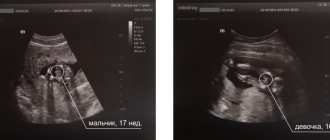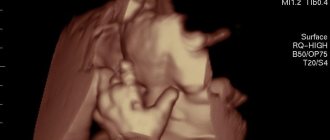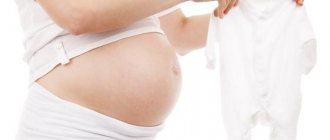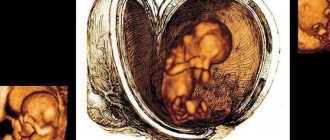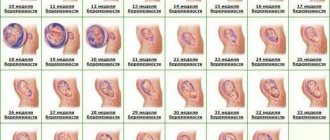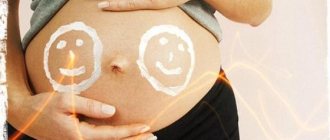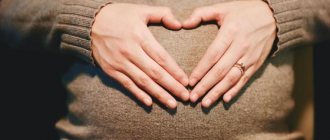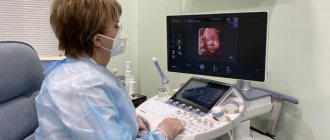There is already a real person inside you! His weight is now 150 g, and his length is about 12-14 cm. The baby is constantly fidgeting and you may already feel this quite often. The vessels through which blood flows are clearly visible through the thin skin, so the skin appears bright red. The ears took their final position and even protruded a little. At week 18, nerves begin to become overgrown with myelin, a substance that forms a sheath around nerve fibers. The myelin sheath will continue to form for a whole year after the baby is born. The future girl has formed a uterus and fallopian tubes, and the future boy already has something to brag about. True, many boys hide their dignity during an ultrasound, maintaining intrigue until the next examination.
The cerebral cortex also does not stop developing, nerve cells are constantly dividing, convolutions and grooves are formed. The functioning of the adrenal glands and thymus gland, which are organs of the human endocrine system, begins. The hormones that the fetus now produces are enough for both itself and the mother. If the mother's endocrine glands do not produce enough hormones, the fetus compensates for this deficiency. However, in this case, there is a possibility that the unborn child will have impaired activity of the gland whose activity is impaired in the mother. The skin of the fetus is now transparent, very delicate, all covered with wrinkles, which later form folds.
Interesting Facts
| Options | Indications |
| Time from conception | 16 weeks |
| Period by month | 18 weeks |
| What month | 5 |
| Dimensions and weight of the fetus | 170 mm, 150-200 g |
| Uterus dimensions | At the middle of the distance between the womb and the navel or slightly above |
| Pregnant weight | Gain 400-500 g in 1-2 weeks |
Your baby is the size of
Large potatoes
170mm Size
150-200 g Weight
The eighteenth week of pregnancy is a vivid, memorable time when a woman may for the first time feel the movements of the baby inside her. This is an amazing and incomparable feeling. The fetus becomes very active, its movements are more coordinated. What else is going on with baby and mom this week? Let's find out more, but first let's look at the calculations:
Fetometric parameters
Using a special program, the doctor takes measurements on the monitor of children’s indicators of the development of external structures. Decoding is done by comparing the results obtained with the standards. The coccyx-parietal size (child height or CTE) is about twenty centimeters. Changes in the longitudinal (LZR) and bipariental transverse (BPR) size of the fetus are determined in digital indicators: from 4.3 to 6.4 cm and from 3.2 cm to 4.7 cm. According to other parameters, the child gains approximately three centimeters per week . In the table below you can compare the baby's weekly growth.
Changes in digital indicators of the baby's size several weeks before the second scheduled screening
The size of the nasal bone must be examined. This parameter determines the presence/absence of genetic abnormalities in development. Hypoplasia (underdevelopment or absence of the bone structure of the nose) may indicate Downism. The normative indicator of the frequency of contractions of the baby’s myocardium (heart muscle) at this stage of pregnancy is considered to be 140–160 beats/60 seconds.
Feelings of the expectant mother
At 18 weeks of pregnancy, vaginal discharge becomes more abundant. If they are still clear or light in color and you feel itching or burning, there is nothing to worry about. A curdled discharge with an unpleasant odor is a likely symptom of thrush. Be sure to consult a gynecologist.
Fetal movements
At 18-20 weeks of pregnancy, a first-time mother can already feel the baby’s movements. Now they are light, similar to vibration or fluttering. The doctor will ask you to track the number of movements. Normally this is 4-8 times per hour. If you count more or do not feel any movements at all, inform your gynecologist.
Ultrasound sex determination in 3D, 4D images
You can get more accurate results of determining the sex of the unborn child if the ultrasound is performed in 3D or 4D images. With such a study, it is more likely to determine the sex of the child, and you can also get a clear photo and video of the fetus. When conducting a 3D/4D examination, the child’s genitals are visible so clearly that future parents themselves, even without outside help from a specialist, can determine the sex of the unborn baby on the monitor screen.
With such a diagnosis, error is practically eliminated, but this procedure should be carried out no earlier than 12–15 weeks of pregnancy, this will provide a greater chance of informativeness and reliability of the procedure for determining the sex of the fetus.
When the fetus lies in an awkward position and the doctor cannot accurately determine its gender characteristics, then he must warn the parents and inform them that he is not sure about the sex of the unborn baby.
How the fetus develops at 18 weeks of pregnancy
The baby performs many different actions: hiccups, yawns, winces, sucks his thumb, rolls over, pushes off the walls of the bladder with his arms and legs, grabs the umbilical cord and his own legs.
Its body length is about 17 cm, weight is 150-200 grams. The fetal skeleton already consists of 200 bones, by the time of birth their number will increase to 300. For comparison, an adult has 206 bones. As they grow older, they do not disappear, but grow together.
The nervous system is improved:
- more neural connections appear in the brain;
- myelin is formed - the sheath of the nerve, protecting it from damage and accelerating the transmission of nerve impulses;
- The functioning of the senses improves: the baby hears and recognizes sounds, distinguishes the taste of amniotic fluid. It is influenced by the foods that mother ate.
Beauty and accessories
Pregnancy is not a disease; during an “interesting situation” you can and should look beautiful and well-groomed. But this should be done wisely - after all, now you are carrying a baby under your heart and are responsible for him. So, if you want to change your hair color, choose plant dyes (Iranian henna, chamomile, walnut shell, oak bark). The same applies to skin care cosmetics - cosmetics for pregnant women should have a gentle composition and include mainly natural ingredients. Did you read on the label that the cream contains phthalates or salicylic acid? Put the box back - these chemicals can have a negative effect on both the fetus and the health of the pregnant woman.
Tests and ultrasound
The main study at 16-20 weeks is the second pregnancy screening. It includes an ultrasound and analysis of 3 hormones: hCG, estriol and alpha-fetoprotein. Helps determine the risks of developing genetic diseases such as Down syndrome, Patau syndrome, Edwards syndrome, as well as disorders associated with abnormal structure of internal organs. If the ultrasound results are normal, no blood test is usually performed. However, there are cases when you cannot do without it.
Who is particularly recommended for a triple hormone test?
- Pregnant women over 35 years of age, when, due to age-related changes, the risk of the child developing genetic disorders is high.
- Patients with a family history, that is, when someone in the family had similar pathologies, or if the first child was born with chromosomal abnormalities.
- If you have previously had premature birth or miscarriage.
- When a woman suffered from an infectious disease in the first trimester, she took teratogenic drugs without knowing about pregnancy.
- If the results of 1 pregnancy screening were questionable.
Starting from the 18th week of pregnancy, the gynecologist will listen to the fetal heartbeat at each scheduled visit. This gives the specialist an idea of the baby’s condition and presentation in the uterus.
Body changes and new sensations for women
In the second trimester, many women experience shortness of breath. The reason for its occurrence is the intensive growth of the uterus, which puts pressure on the diaphragm, which leads to difficulty breathing. During an attack of severe shortness of breath, doctors advise sitting down on a chair or squatting for a few minutes, or better yet, lying down. But if you lie on your back for a long time, shortness of breath can only intensify - the uterus at this moment puts pressure not so much on the diaphragm as on the vena cava, thereby disrupting the process of blood circulation in the woman’s body. Increased shortness of breath is not the most dangerous thing that can happen when a mother takes a similar position: at this moment, there is a deficiency of oxygen in the fetus’s body, which leads to very unpleasant consequences. Here is the answer to the question why pregnant women should not lie down for a long time, and especially sleep on their backs. Remember: the best position for resting and sleeping while expecting a baby is the position on your left side.
What to discuss with your doctor
- If you are worried that you have a small belly for the 18th week of pregnancy, then know that, firstly, this is subjective and depends on the woman’s general physique. And secondly, to dispel worries, discuss with your doctor whether the rate of fetal development corresponds to obstetric standards. If the baby is developing correctly, there is no point in worrying about waist circumference.
- Tell your doctor if you have frequent back pain and see if you should wear a back brace.
Possible complications
You may experience lower back pain. They arise because the center of gravity shifts due to the growing belly. Massage, a warm shower, swimming and exercises that strengthen your back muscles will help you cope with this.
If at 18 weeks of pregnancy you periodically experience tightness in your lower abdomen, do not worry. The muscle ligaments holding the uterus are stretched. Therefore, short-term pain occurs. However, for prolonged spasms, consultation with a gynecologist is required.
If you stand up suddenly, you may feel dizzy. It is caused by low blood pressure or low blood sugar. Therefore, in the morning, do not rush to get out of bed, do it smoothly. You can leave some fruit on the nightstand for a light snack in the evening.
Hormonal changes and increased blood volume cause anemia in many pregnant women. Most often it is associated with iron deficiency. In this case, diet adjustments are not enough; long-term treatment with special iron supplements is necessary.
How is diagnostics carried out?
18 weeks - approximately 4 months pregnant. At this time, an ultrasound examination is carried out through the abdominal cavity with a transabdominal probe. Sometimes at this stage a transvaginal sensor is used if the pregnant woman is overweight, since ultrasonic waves do not pass through large layers of fat well.
During the study, ultrasound is reflected from the dense tissues of internal organs. In pregnant women, the fetus is visible with the uterus in different planes. The sonologist records the main external and internal values, recording the information received in the protocol. Afterwards, the result of the ultrasound at 18 weeks is transferred to the gynecologist who is managing the pregnancy.
Dietary recommendations
Throughout pregnancy, your diet should be balanced and nutritious. What does it mean? Your daily menu should include:
- 4-5 servings of fruits and vegetables;
- 4 servings of dairy or other calcium-rich products;
- 3 or more dishes made from whole grains (porridge, whole grain bread, durum wheat pasta);
- 2-3 – lean protein, that is, meat and a variety of legumes.
You should have fish on your table 2 times a week, but don’t often choose fish that can accumulate mercury, for example, tuna, marlin, swordfish.
Do you need vitamin supplements?
If you eat a varied diet, are not a vegetarian, and have access to vegetables and fruits all year round, then you do not need additional vitamin intake. The exception is folic acid in the early stages of pregnancy and vitamin D, the deficiency of which in our region is associated with the number of sunny days per year.
If you have any chronic diseases, for example, the thyroid gland, you may need additional iodine. The issue of taking medications should be decided together with the doctor monitoring the pregnancy.
What's happening?
Metabolism changes depending on the needs of the growing baby. Active accumulation of protein occurs, the content of healthy fats increases, which are deposited in the mammary gland, under the skin. Salts accumulate, which are used to form and build the child’s body. The need for vitamins D, E, C and group B increases. The formation of the fetal skeleton continues, and the immune system develops. From this stage of pregnancy, it is recommended to wear a bandage in order to maintain the uterus in a normal position.
Checklist for 18 weeks of pregnancy
- Talk to your baby more often, he hears you and understands your emotional state. Music and your singing also have a beneficial effect on a child's development.
- When you lie down or sit for a long time, change your body position more often so as not to cause blood stagnation in the pelvic organs.
- If you experience leg cramps at night, avoid prolonged vertical exercise. Consult a specialist about the need to take magnesium. Often its deficiency causes involuntary muscle contractions.
Entrust your pregnancy management to the specialists of the Medical Women's Center. We guarantee an attentive and sensitive approach to each of our patients.
Possible deviations
According to ultrasonic indicators, it is possible to identify the following deviations:
Gender determination by ultrasound at 20 weeks of pregnancy
- abnormal development of the skeleton (curvature);
- underdevelopment of new bone;
- low CTE value;
- accumulation of fluid in the structures of the brain (dropsy);
- increase in the thickness of the cervical-collar zone (TVP or thickness of the collar space);
- heart failure;
- undeveloped upper jaw and ears;
- abnormalities of brain structures (underdevelopment of the frontal lobes and cerebellum);
- increased bladder volume;
- pathologies of the gastrointestinal tract.
In this situation, additional testing for hormone levels is required. A woman is required to undergo a blood test to determine alphafetoprotein (AFP protein), “pregnancy hormone” or human chorionic gonadotropin (hCG), free estriol (E3). Based on the combined results of the analysis and ultrasound of 18 weeks of pregnancy, genomic diseases can be identified: severe pathology of the child’s nervous structures (anencephaly), downism and genomic syndrome of trisomy 18 (Edwards syndrome), hereditary anomalies (Turner and Patau syndromes).
Amniocentesis, the collection and analysis of amniotic fluid, is considered a cardinal screening measure. The procedure is performed in a hospital setting. Based on its results, a diagnosis of a possible chromosomal disorder in the baby is made.
